A lot of small businesses rely on spreadsheets for contact management. They’re simple, familiar, and free.
But as your customer base grows, so does the complexity – more contacts, more conversations, more follow-ups. Instead of focusing on customers, you find yourself lost in a maze of spreadsheets, emails, and disorganized contact details.
But even at this stage, many business owners often hesitate to switch. They assume contact management software is either too complicated or too expensive.
That’s not the case, though! There are contact management tools built for small businesses – easy to use, budget-friendly, and free from enterprise-level complexity.
In this guide, we’ll break down what contact management software is, why small businesses need it, and the best tools to help you stay organized without overcomplicating things.
What is contact management software?
Contact management software is a tool that helps businesses store and organize customer details, track interactions, and manage follow-ups in one place. Instead of relying on scattered spreadsheets, emails, or notebooks, it keeps everything structured and easily accessible.
At its simplest, a good contact management tool helps you:
- Store all customer details in one place (no more scattered spreadsheets).
- Track conversations so you always know where you left off.
- Set reminders so you never miss a follow-up.
- Organize contacts with tags, notes, and history for quick access.
Some platforms go beyond the basics, offering features like reporting, email automation, and pipeline management. Managing customer relationships should be easy, not overwhelming – and the right tool makes that possible.
Benefits of using customer management software
A contact management system replaces the guesswork and manual labor with automation, organization, and better insights.
One-click automation – New contacts, follow-ups, and interactions get logged automatically. Forget about doing it in spreadsheets – every new contact, update, and follow-up has to be updated manually, taking up hours of your time.
Centralized customer history – Every email, call, and note is stored in one place for full visibility. In spreadsheets, calls, emails, and meetings aren’t linked to a single contact, so you have to dig through inboxes and notes.
Reliable, accurate data – No more duplicate records or missing details – everything stays up to date. A simple typo or forgotten update can mean lost leads and messy records, but this is not your worry with customer management software.
Seamless collaboration – Multiple team members can access and update contacts without confusion. In spreadsheets, it would be impossible – with multiple people handling customers, version control quickly becomes a nightmare.
Built to grow with you – Whether you’re managing 10 or 10,000 contacts, a CRM keeps everything structured. Spreadsheets seem fine at first, but as customer numbers rise, they create more problems than solutions.
Stronger security – Backups, access controls, and encrypted data protect your business. Without proper security controls, spreadsheets put sensitive customer information at risk. No built-in backups, no permission control – you’re just one accidental deletion away from losing key data.
Best contact management software for small businesses
If manual data entry is slowing you down, it’s time to explore contact management software. Here are the best options to consider.
Capsule CRM
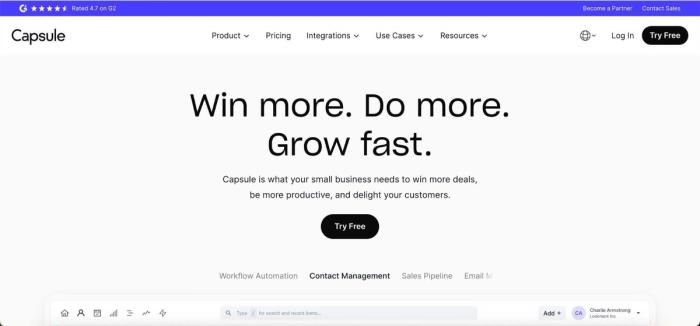
Using Capsule CRM is like riding a bike – you don’t need a manual, you just get on and go.
For small businesses new to CRM tools, it’s built to be intuitive from day one, so you can focus on selling instead of figuring out complex software.
The free plan is perfect if you're just getting started, while more advanced features like automation and customization grow with you – without overwhelming you.
Key features built for small business
- Keep all contacts in one place without the clutter → Capsule stores customer details (emails, phone numbers, notes, and social media profiles) in a clean, easy-to-navigate dashboard, so you never lose track of a lead again.
- Know exactly when and how you last spoke with a customer → Capsule logs emails, calls, and meetings automatically, giving you a full conversation history at a glance – so every follow-up feels personal, not forced.
- Organize contacts in a way that makes sense to you → Use custom fields and tags to segment leads by industry, location, purchase history, or anything else that matters to your business. No more scrolling through endless lists.
- Never forget a follow-up → Get reminders for important tasks – whether it’s reaching out to a lead, sending a contract, or checking in with a past client.
- Track deals in a simple, visual pipeline → See every open opportunity at a glance, track progress, and get a realistic forecast of what’s about to close.
- Automate emails, so you don’t have to chase every lead manually → With Transpond integration, you can set up automated email sequences – hands-free.
- Take your CRM anywhere → No matter if you’re at your desk or on the go, Capsule’s mobile app lets you update customer info and stay in touch with your team from anywhere.
- See what’s working (and what’s not) → Custom reports and sales analytics help you spot trends, track team performance, and make data-backed decisions – but without needing a data scientist.
- Connect Capsule to the tools you already use → From QuickBooks and Mailchimp to Zapier and Transpond, Capsule integrates with the apps you rely on, so your systems work together seamlessly.
- Keep customer data secure and under control → Set permissions to decide who can view, edit, or manage contacts.
What makes it great for small businesses?
Capsule CRM gives small businesses a clear, structured way to manage contacts, track interactions, and stay on top of follow-ups – without getting buried in spreadsheets or complex software. Many CRMs add unnecessary steps, but Capsule keeps things practical, making it easy to organize customer relationships and act on opportunities.
Instead of forcing a rigid system, Capsule adapts to how you work. Custom fields, tags, and pipelines let you track what matters most, while automation takes repetitive tasks off your plate.
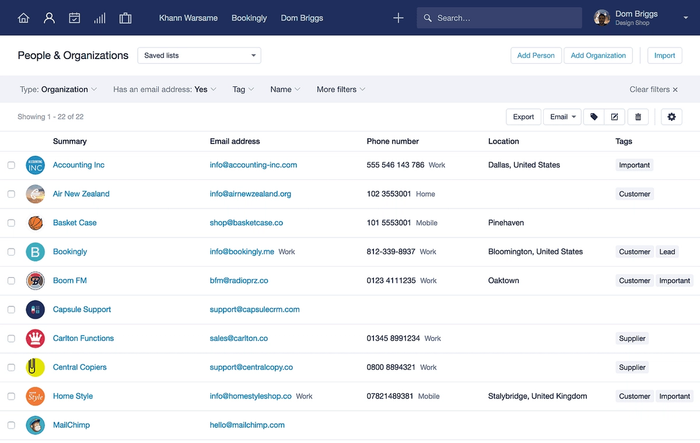
Need email marketing? Capsule integrates directly with tools like Transpond, so you can manage everything in one place.
It’s simple to set up, easy to use, and scalable when you need more advanced features. And with a free plan available, you can start using it today without any upfront cost.
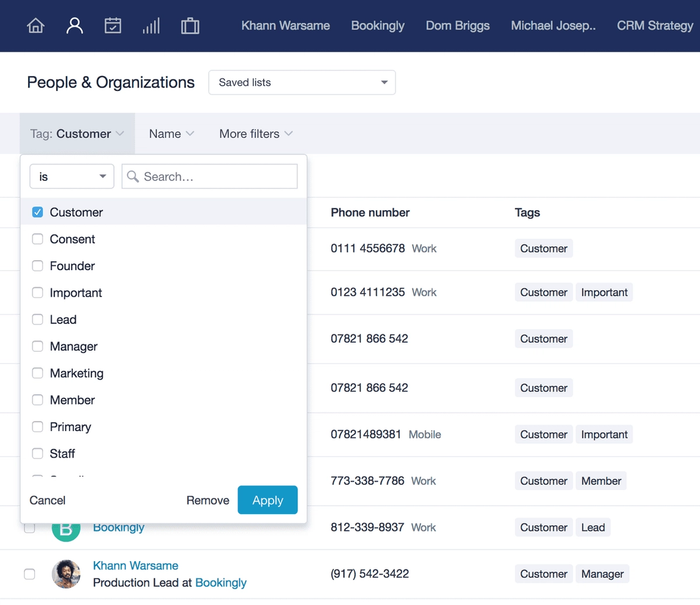
Try Capsule CRM for free today.
Sign up for your free trial of Capsule today.
BIGContacts
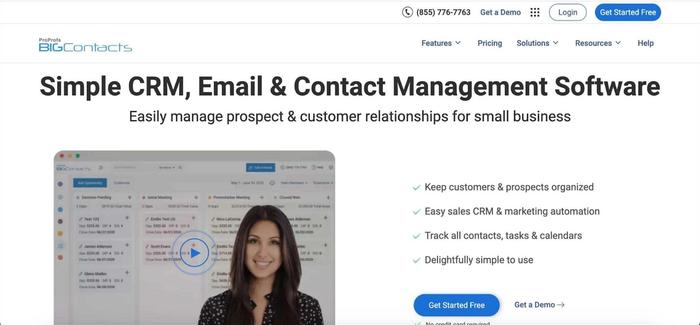
BIGContacts is a contact management tool designed for small businesses that need a simple way to store contacts, track conversations, and set follow-up reminders. It covers the essentials, making it a decent choice for teams that aren’t ready for a full-fledged CRM. However, while it may seem like an affordable entry point, its limitations become apparent as businesses grow.
Customization options are fairly limited, meaning users have to work within a predefined structure rather than shaping the system to fit their needs. While it includes basic features like email and calendar integrations, it lacks deeper automation tools or integrations with AI voice agents, making manual follow-ups a necessity. Pricing is another consideration – while the starting cost appears low, many essential features require an upgrade, making it less budget-friendly than it first seems.
BIGContacts offers a 30-day free trial, allowing businesses ample time to assess its features before committing.
For small teams that only need a basic contact manager, BIGContacts is a reasonable choice. But for businesses that want more flexibility, automation, and scalability without hidden costs, there are stronger alternatives.
ActiveCampaign
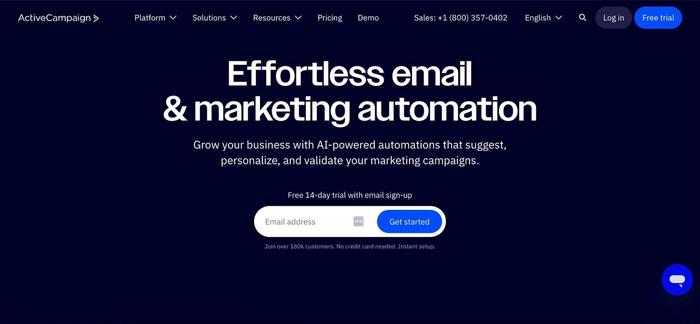
What if automation is your priority, but simplicity matters too?
ActiveCampaign is built for businesses that want to do more than just manage contacts—it’s designed for companies ready to automate their entire customer journey. From follow-up emails to deal tracking, it helps create highly personalized marketing and sales workflows.
That level of control is great if you have a dedicated team to set it up and maintain it. But for a small business that simply wants an easy way to keep track of customers and interactions, it can feel overwhelming. Getting the most out of its automation features often requires time, training, and higher-tier plans. It provides a 14-day free trial, enabling users to explore its automation and email marketing capabilities.
If your business thrives on automation and you’re prepared for the setup, ActiveCampaign is worth considering. But if you’re after a straightforward system that organizes contacts without extra complexity, you may want something more tailored to small business needs.
Streak
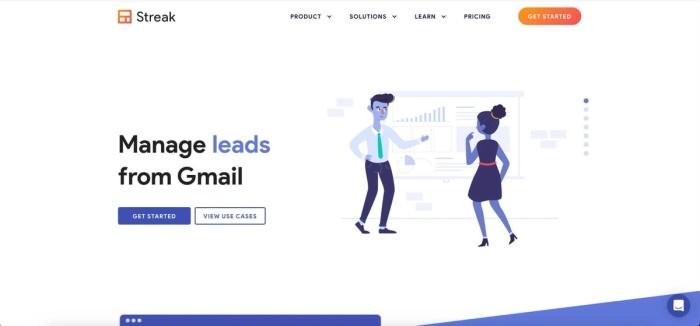
If your entire business runs on Gmail, Streak CRM helps keep things simple. It lives inside your inbox so instead of switching between tools, you can track contacts, manage deals, and automate follow-ups right from Gmail.
For Gmail users, this deep integration is a huge plus. Streak automatically logs emails, organizes conversations, and even lets you track when recipients open your messages. But that convenience comes with a limit: if your team uses Outlook or another email provider such as EmailLabs, Streak isn’t an option.
For businesses fully committed to Gmail, Streak makes contact management feel seamless. If you want flexibility beyond a single email system, you might need something more versatile.
Nimble
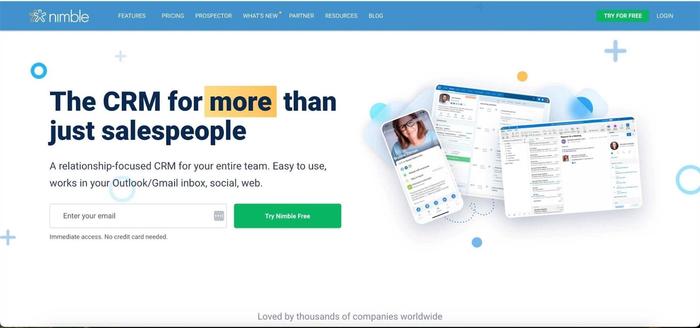
Nimble CRM offers an easy way for small businesses to track contacts, conversations, and social media interactions in one place. It automatically pulls customer details from LinkedIn, Twitter, and email, making it easy to build rich contact profiles without manual data entry.
For teams that want social media insights alongside traditional CRM features, Nimble checks the right boxes. But at $24.90 per user per month, Nimble is one of the pricier options in this category. Compared to Capsule’s $18/user/month plan, that extra cost adds up – especially as your team grows. If social media integration is a must-have, Nimble is worth considering.
ContactBoss
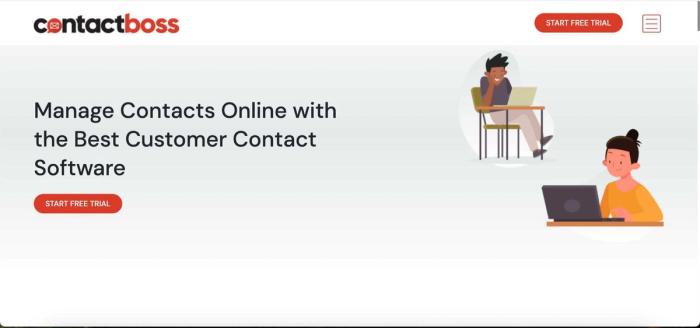
Spreadsheets can work – until they don’t. Small businesses often hold onto manual contact tracking longer than they should, only realizing the inefficiencies when disorganization starts costing them sales. ContactBoss offers a step up from spreadsheets without the steep learning curve of a full-fledged CRM.
Designed for simplicity, it provides essential contact management features, like centralized storage, interaction tracking, and advanced search tools. Businesses that need a straightforward way to store and retrieve customer data will find it useful. It also offers a 14-day free trial, allowing organizations to explore its contact management capabilities.
However, while ContactBoss keeps things basic and budget-friendly, growing teams needing automation, deeper customization, or sales pipeline tracking may outgrow it quickly.
Monday.com
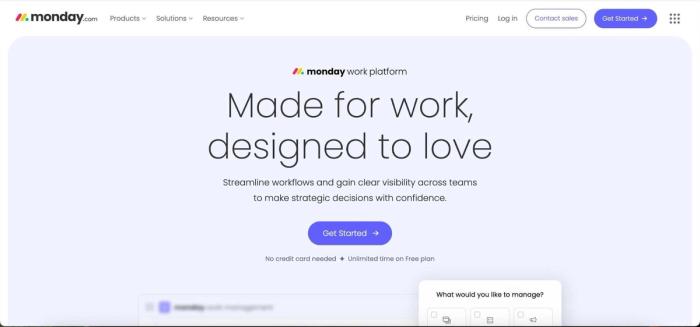
Monday.com does a bit of everything – which can be both a strength and a drawback. It’s a highly customizable work management platform that includes contact management features, but it’s not a dedicated CRM. Small businesses looking for an all-in-one tool may appreciate its flexibility, but those who need a focused, sales-driven system might find it overwhelming.
The platform offers workflow automation, real-time collaboration, and a visual interface that helps organize contacts and track interactions. Its broad functionality means businesses may spend more time setting it up than actually using it.
Zendesk Sell
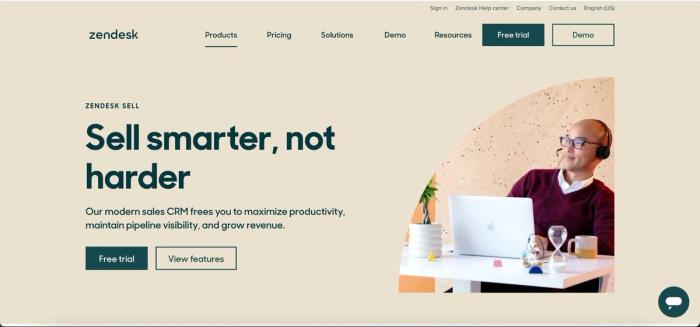
Lead and deal tracking is at the heart of Zendesk making it a logical choice for businesses focused on structured sales pipelines. It simplifies follow-ups with automation and integrates with Gmail and Outlook to keep communication in one place.
The mobile app ensures teams can access contact details and deals from anywhere. But for small businesses that don’t rely on Zendesk’s broader support suite, is it the most practical option? If your team needs flexibility beyond sales tracking – like deeper customization or built-in email marketing – there are other options to consider.
Zendesk Sell provides a 14-day free trial for testing sales tracking and CRM features in practice.
HubSpot
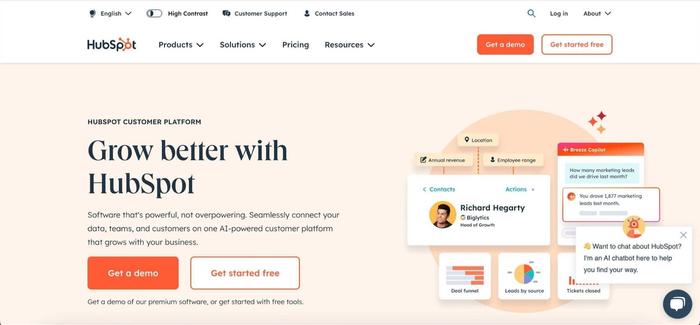
HubSpot has long been a go-to name in the CRM space, but its core contact management features feel outdated compared to more agile alternatives.
While it offers a free plan, many essential features – like automation and advanced reporting – are locked behind expensive upgrades. It’s built for businesses that want to stay within the HubSpot ecosystem, which can quickly become a costly commitment.
For small businesses looking for a flexible, cost-effective solution that doesn’t force them into an expensive all-in-one suite, Hubspot might not be the best pick.
Pipedrive
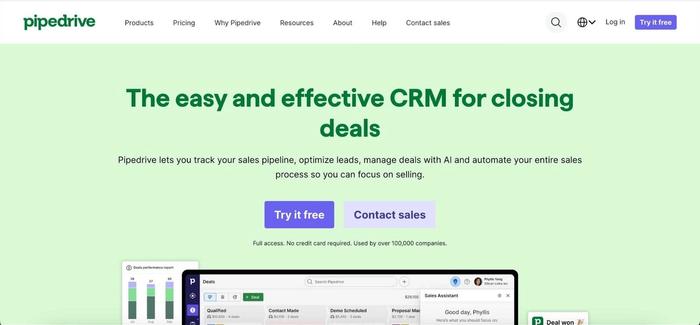
Pipedrive is built with sales teams in mind, offering a highly visual pipeline to track deals and follow-ups. For businesses that rely heavily on structured sales processes, it’s a solid option. It might not be the most cost-effective choice for small businesses that need an all-in-one tool.
Features like email marketing and automation require third-party add-ons, which can drive up costs. If you need a CRM that covers more than just sales without inflating costs, Capsule delivers a well-rounded and budget-friendly option.
Keap
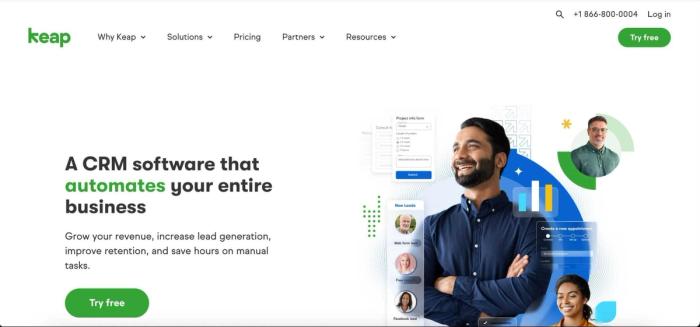
Small business owners often need more than just a place to store contacts – they need a system that helps them follow up, stay organized, and drive sales. Keap aims to cover all of this in one platform, combining contact management with automation and email marketing.
Its built-in follow-up features make it easy to stay on top of customer interactions, while its segmentation tools help personalize outreach. It has its drawbacks, though. With so many features packed in, Keap may feel like overkill for businesses that just need a straightforward way to manage contacts.
For those who don’t require advanced automation or marketing tools, a simpler, more cost-effective CRM might be a better fit.
Freshsales
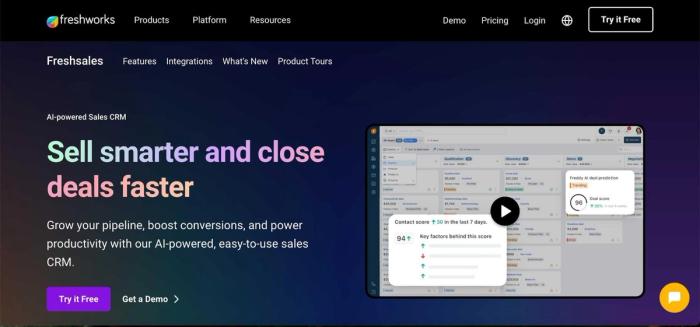
Automation is great – until you realize you might not need it. Freshsales offers AI-powered lead scoring, automated follow-ups, and outreach segmentation, making it a solid option for sales-heavy teams managing a high volume of leads. But for many small businesses, these extras add complexity rather than value.
Freshsales can work as a simple contact management tool if you're just starting out. However, compared to Capsule, it has notable gaps – smaller file storage (2GB vs 10GB), fewer integrations (30+ vs 50+), and a lower contact limit. As your business grows, these constraints can make scaling harder, forcing you to upgrade sooner than expected.
Provides a 21-day free trial, allowing users to assess its AI-based lead scoring and contact management capabilities.
Conclusion
Capsule CRM is the best contact management system for companies looking to have essential features, high customizability and excellent pricing. As you grow your business and contact lists, Capsule grows with you, allowing you to add more seats and upgrade to more powerful plans at a small increase in cost.
Organize your contacts and improve your sales, marketing, and customer support with one tool. Sign up for your free trial of Capsule today.



![Business statistics every business owner should know [2026]](https://cdn.sanity.io/images/poftgen7/production/5619faf6a65f53406d3e554c11c9e894402d4397-5760x3240.jpg?rect=5,0,5751,3240&w=300&h=169&q=75&fit=max&auto=format)
